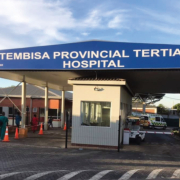|
Getting your Trinity Audio player ready...
|
Image: Newsday
Article first published on Newsday
Whistle-blower Babita Deokaran, who worked in the Gauteng Department of Health, sent a chilling message to her boss: “Our lives could be in danger.” Twelve days later, she was dead.
Award-winning News24 journalist Jeff Wicks has devoted years to unravelling the dark web of who ordered her murder and the evil behind it.
In his new book, The Shadow State: Why Babita Deokaran had to die, released on Friday 22 August, Wicks intricately unpacks what he discovered.
He set the scene in a series of posts on X, which tracked the events surrounding Deokaran’s murder in 2021.
Deokaran was a civil servant who worked her way up from an accounting clerk to the acting chief director of financial accounting at the Gauteng Department of Health. In August 2021, she halted R850-million in suspicious payments to hundreds of companies linked to Tembisa Hospital. She uncovered a sophisticated extraction network draining public health funds meant for the poorest communities, and called for a forensic investigation.
On 11 August 2021, she alerted the department’s chief financial officer that their lives could be in danger.
“Morning CFO, I am just worried that the guys in Tembisa are going to realise we are onto something. Our lives could be in danger,” she said.
Her boss, Lerato Madyo, replied: “Morning Babita, I have requested the HOD’s grant approval for the investigation.”
“This was a lie. No investigation was ever launched. The payments were released after her death,” Wicks said.
Deokaran was shot dead in a hail of bullets outside her home in Mondeor, Johannesburg. She had just dropped off her daughter at school. For weeks leading up to her murder, she was being watched. Six professional hitmen were already planning her assassination.
Although the hitmen paid to kill her were caught, Wicks started to investigate the murder, asking who ordered it and why. Like Deokaran, he soon learned about shell companies, inflated prices, and collusive bidding linked to the Gauteng Department of Health.
Her decision to stop the money meant exposing the syndicate. “In South Africa’s shadow state, whistle-blowers who threaten billion-rand corruption networks don’t live long,” Wicks said.
Wicks said Deokaran’s death exposed how the shadow state operates where officials enable extraction and whistle-blowers get eliminated.
“Investigations get buried, and public money disappears into private pockets. The Hawks failed to follow the money trail back to those who ordered the hit. Justice remains incomplete,” he said.
Wicks’ investigation into Deokaran’s murder profoundly changed and even endangered his life, as he bravely followed the leads she had left behind.
In The Shadow State, he uncovers an audacious web of crooked officials, criminal syndicates, and ANC politicians, siphoning away billions meant for patients in Gauteng’s public hospitals.
This investigation into greed and state capture is also a tribute to the courage of one woman who, when confronted by powerful wrongdoers, refused to keep quiet.
“This book is dedicated to Babita Deokaran for her uprightness and unwavering commitment to her own code of doing the right thing,” he said. “When she found signs of insidious extraction from Tembisa Hospital, she was unable to look away. Her crime was knowing too much, and the price was her life.”
The Shadow State: Why Babita Deokaran had to die is available now.







